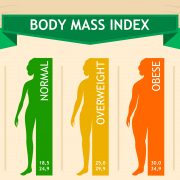What is Body Mass Index (BMI) & How it is Calculated?
Bariatric Surgeon in PuneBody Mass Index (BMI) is a calculated value from the mass (weight) and height using BMI Calculator.
BMI is defined as the body mass over body height square, and is universally expressed in units of kg/m2, resulting from mass in Kgs and height in mts.
The BMI is widely used to categorize a person as underweight, normal weight, overweight, or obese based on muscle, fat, height, and bone of an individual person.
Mostly Body Mass Index (BMI) ranges are underweight (under 18.5 kg/m2), normal weight (18.5 kg/m2 to 25 kg/m2), overweight (25 kg/m2 to 30 kg/m2), and obese (over 30 kg/m2).
BMI provides an easy numeric measurement of a person’s thickness or thinness.
Why it’s important?
BMI (Body Mass Index) is an important factor because it is widely regarded that your chances of having a longer and healthier life are improved if you have a healthy BMI.
If your BMI is at high level, then you may also have an increased risk of developing type 2 diabetes, as well as other metabolic diseases such as heart related disease, hypertension and high cholesterol.
Obesity is classified in 4 different ways which are as follows,
- Underweight
- Normal weight
- Overweight
- Heavily overweight (Obese)
BMI of less than >18.5
A BMI of less than 18.5 kg/m2 indicates that you are underweight and you definitely need to add some weight. Adopting a good diet is really important for you. You may need to consult the dietitian for an advice.
BMI of 18.5 – 24.9
A BMI of 18.5 kg/m2 – 24.9 kg/m2 indicates that you have a healthy weight for your height. By maintaining this weight, you can lower the risk of developing serious health related issues.
BMI of 25 – 29.9
A BMI of 25 kg/m2 – 29.9 kg/m2 means that you are slightly overweight. You may be advised to lose some weight for health reasons. It’s recommended to you that you need to talk to the doctor or a dietitian for an advice.
BMI of over 30
A BMI of over 30 kg/m2 tells that you are heavily overweight. You may be at risk if you don’t lose your weight. You must have a visit to the doctor for a good advice on your health.
Use this BMI calculator to find out what’s your number
Heart related issues
- Diabetes (Type 1 and Type 2)
- Hypertension
- Sleep apnea
- Stroke
- Infertility
- Gallbladder disease
- Dyslipidemia
- Cancers (At least 8 different type and more)


 +919011100010
+919011100010 
